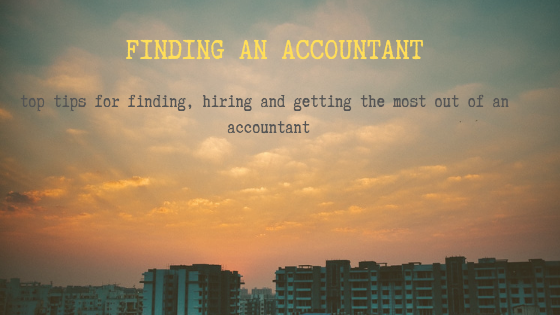I have worked closely with accountants my entire working life, and still I had a real struggle trying to find one for my business. One who would be my best advocate, one that would keep me on track and one that would be understanding of the pressures of #smallbusinesslife.
The good news is I was able to put together my learnings and create a checklist to make it as easy as possible.
It boils down to three main steps.

STEP ONE: Get a list of accountants that might work for you.
This will take a bit of work upfront, but believe me, if you are going to trust someone with your financial information, you do *not* want to just pick one randomly.
Some ideas for where to find accountants to add to your list:
- Referrals from people you know – whether that be your buddies or (preferably) biz buddies
- Referrals from professionals you trust – I think of insurance brokers, financial advisors, lawyers, or your bank if you have a working relationship with them
- Facebook Groups – local groups or specific business groups can be especially useful. A word of warning though: some people seem to be in referral rings – their friends keep referring them in the same few groups. I was caught by this trap and I’ll discuss my next learning on this in Step Three below)
- Your local shopping strip – there are generally accountant shop fronts along your local high street. Take their names down if you think they look like they might be a fit.
- Good ole Google. Be specific about what you are looking for, such as “accountant for photographer” or “personal trainer accountant”. You never know, there may be an accountant specialising in your specific business.
STEP TWO: Research these accountants
Just because Mary referred you or Jason has used his accountant for years does not mean that they are right for you.
Check if shortlisted accountants have experience with your type of business.
Read reviews to get an idea of their strengths and weaknesses. For example are they timely with submitting your returns (and providing your refunds); provide good customer service and are good communicators.
Where do you research?
- Google reviews
- Facebook reviews
- Their website
- Ask around
Although this part is pretty straightforward, you may still find valuable information from this research that will help with the next step and/or to rule some out altogether.
STEP THREE: Interview your short list
I wouldn’t suggest a full interview, of course. But you will likely have questions that come from your research. If you really don’t know what to ask, I’ve listed a few suggestions below.
- My business is x. Do you have any clients also with this type of business? (So you can understand their experience with your specific needs.)
- Timely returns are really important to me. What systems do you have in place (eg extra staff, pre-cut off meetings, automated reminders to clients) to ensure returns are submitted on time? (This will help you understand if they will be proactive in meeting those deadlines, or if the onus will be firmly with you. Also it will give you an indication of their communication styles and preferences.)
- What percentage of your time is spent on small business versus individual tax returns? (To get a feel for their experience with small business owners.)
- I see you charge x for a tax return. What does that include? (eg how many hours of face-to-face contact versus back office work).
- What other services do you offer? (You may find there are other things you have vaguely thought about it that they can help you with such as setting up a Self Managed Super Fund or assisting with registering a company).
I would love hear your personal experiences of choosing an accountant. Was it just trial and error before you found “the one”. Or are you too scared to change, even though you aren’t sure if they are right fit? Let me know in comments below.
Have a great day!
Eliza

